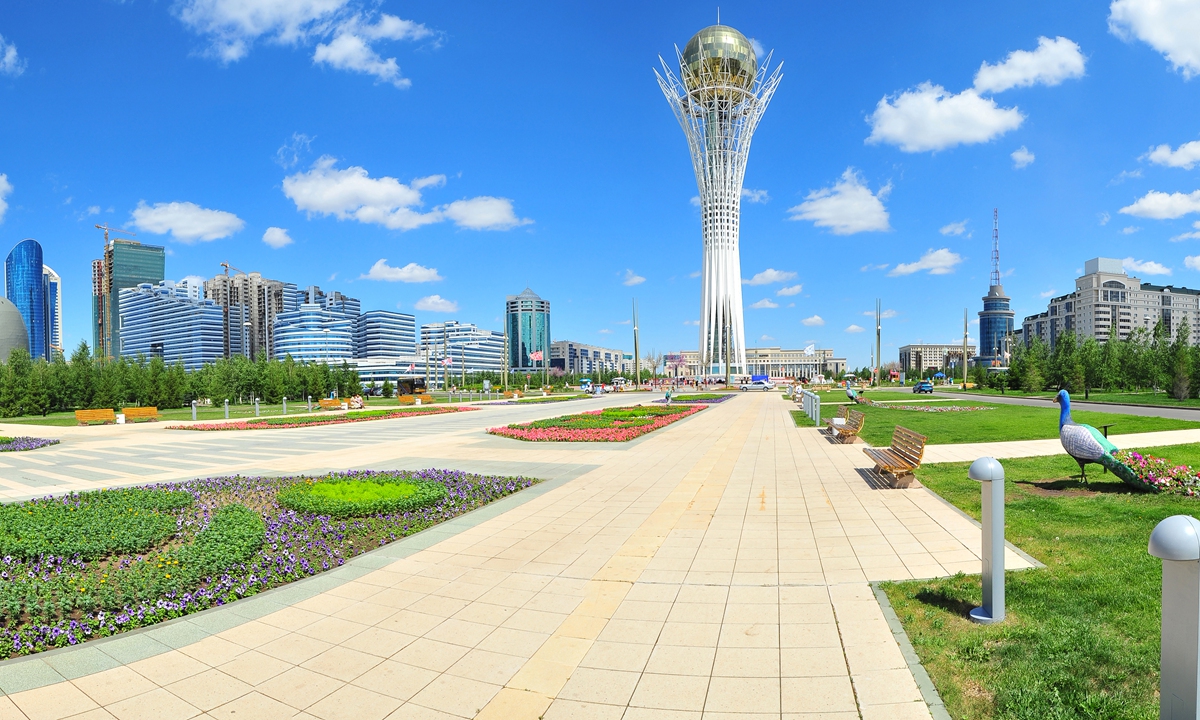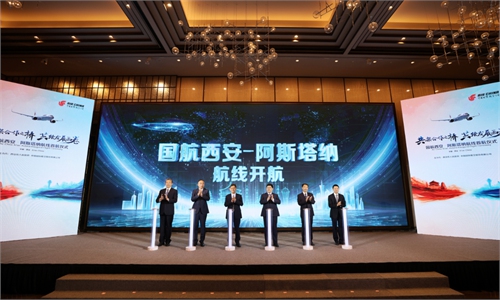IN-DEPTH / IN-DEPTH
Witness to history: Silk Road Economic Belt wise way to Eurasia connectivity, global stability, says Kazakhstan educator
Silk Road Economic Belt wise way to Eurasia connectivity, global stability: Kazakhstan educator
Editor's Note:
Promoting high-quality development of the Belt and Road Initiative (BRI) is a major step toward building a global community of shared future. This year marks the 10th anniversary of BRI, through which China has signed more than 200 cooperative documents under the BRI framework with 151 countries and 32 international organizations.
Over the last decade, China showed the world how it turned the BRI into a major cause that benefits the people of countries along the route and enables the people of these countries to share China's solutions and wisdom.
The Global Times interviewed witnesses who were present in 2013 when the Silk Road Economic Belt and the 21st Century Maritime Silk Road, both of which are integral parts of the BRI, were proposed respectively in Kazakhstan and Indonesia. They recalled how they were inspired by the concepts and shared their observations of how the BRI has benefited their countries.
In this series, the Global Times features first-hand accounts from witnesses who were at the forefront of historic moments. From scholars, politicians, diplomats to ordinary citizens, their authentic reflections on the impact of historical moments help reveal a sound future for humanity through the solid steps forward taken in the past and the present.

A decade on, Saule Koshanova, foreign director of the Confucius Institute at the L.N. Gumilyov Eurasian National University in Kazakhstan, is still very impressed by being a witness to what she calls "a historically important event" - the visit paid by Chinese President Xi Jinping and his proposal of the Silk Road Economic Belt at Nazarbayev University in September 2013. The concept ignited not only the dream of Eurasian connectivity, but also Koshanova's dream of deepening cultural exchanges as an educator around the world.
"Kazakhstan, sitting on the ancient Silk Road, has made an important contribution to the exchanges between the Eastern and Western civilizations and the interactions and cooperation between various nations and cultures," President Xi addressed at Nazarbayev University in Astana on September 7, 2013, during his visit.
"Throughout the millennia, the people of various countries along the ancient Silk Road have jointly written a chapter of friendship that has been passed on to this very day. The over 2,000-year history of exchanges demonstrates that on the basis of solidarity, mutual trust, equality, inclusiveness, mutual learning, and win-win cooperation, countries of different races, beliefs, and cultural backgrounds are fully capable of sharing peace and development. This is the valuable inspiration we have drawn from the ancient Silk Road," Xi said in his speech.
To forge closer economic ties, deepen cooperation, and expand the development space in the Eurasian region, Xi proposed an innovative approach to jointly building an "economic belt along the Silk Road."
As a representative of scholars attending Xi's speech, Koshanova felt "fortunate" to witness the birth of such "a great new model in the Eurasian space."
"Like most of those present, I was inspired by the idea of reviving the Great Silk Road in today's realities and connecting different parts of Eurasia through transport corridors. China and the Central Asian countries share a common strategic goal, which is stable economic development, prosperity, and the power of the states," Koshanova recalled.
"The speech resonated powerfully among politicians and economists, as the Chinese top leader put forward a foreign policy initiative that affects the economic development of an entire continent, Eurasia," Koshanova noted.
The director called the BRI "a sunny road for everyone, instead of a private path for any single party."

Actual benefits boost local recovery
Offering prosperity is never an empty slogan, but specific measures, as Koshanova underlined, that convert the advantages of political dialogue, geographic proximity, and economic complementarity into the advantages of cooperation and common gain.
"Thanks to the BRI project, the delivery time of goods from China via Kazakhstan to EU countries has been reduced by an average of 3-4 days compared with delivery via Russia or Mongolia. Notably, China, in turn, has provided Kazakhstan with a sea route to develop economic exchanges with Asia-Pacific countries," she said.
The list of visible benefits keeps expanding, as the number of China-Europe railway express trains passing through Kazakhstan has continued to grow even in economically difficult times.
Moreover, some flagship projects under the BRI framework such as the Aiju Agricultural Products Logistics Processing Park and Western Europe-Western China Expressway, a China investment, have been successfully completed, further paving the way for wider circulation of the goods in the region.
Kazakhstan had been facing a tough time economically after having grappled with a nationwide lockdown and low oil prices due to the raging COVID-19 epidemic in 2022. Amid mounting challenges, the implementation of key Chinese-Kazakh cooperation projects has been pressing ahead, showcasing the resilience and vitality of the BRI, which partly helped the oil-rich country weather its socio-economic storm, local media reported.
Koshanova told the Global Times that the Embassy of China in Kazakhstan pays great attention to the transparency and openness of Chinese enterprises in the country. She was assured of this fact after she joined a tour group organized for scholars and journalists to visit Chinese companies in Aktau, Atyrau, Shymkent, and Almaty in November 2017.
"We saw the high quality of work and products by enterprises, and their contribution to the development of the economy of Kazakhstan," she said.
This demonstrates that the BRI adheres to high standards, implements sustainable projects, and contributes to improving living standards, Koshanova suggested, in contrast to certain Western media sources' groundless accusations of opaque operations and hypes of negative impacts caused by Chinese companies along the BRI.
Enhanced exchanges arouse interests
As an educator, Koshanova said she can feel a gradual "Chinese language fever" in the countries along the Belt and Road.
In 2006, as promoted by two governments and supported by the Chinese International Education Foundation (CIEF), the first Confucius Institute was opened in Kazakhstan at the L.N. Gumilyov Eurasian National University.
Koshanova said she felt "very grateful" to be the Kazakh head of the institute upon invitation. "Since the opening of the Confucius Institute, we have seen a continuous increase in those wishing to learn Chinese. During the pandemic, the switch to an online learning format allowed us to expand the geography of our students to citizens of Kyrgyzstan, Russia, Iran, Germany, Turkey, and other countries. Our students plan to continue their master's or doctoral studies in Chinese universities or dream to work in Kazakh-Chinese companies in the future," she told the Global Times.
The institute organized courses for all levels of fluency in the Chinese language, running a number of exhibitions, lectures, competitions, and contests in Chinese studies, and also offering internships in Chinese universities.
"At a time of global instability and unpredictability, overcoming differences through dialogue and resolving disputes through exchanges becomes especially relevant," said Koshanova, who speaks highly of the cultural exchanges outlined in the Xi-proposed Global Civilization Initiative.
Koshanova believes that the BRI, together with the concept of building a global community of shared future, has brought great certainty to the sustainability of peace, and has encouraged Asia to be an engine of global growth and a new blueprint for international cooperation.
As President of Kazakhstan Kassym-Jomart Tokayev noted in his speech at the Munich Security Conference in February 2020, the Central Asian region is one of the key areas for the implementation of this megaproject. "It is obvious that when choosing our capital to announce its most important initiative, the Chinese leadership took into account Kazakhstan's consistent commitment to the idea of reviving the Great Silk Road through the adoption of the role of a trade and infrastructure hub for the entire Eurasian continent by Central Asia," said Tokaye as reported by the Astana Times.
The modern-day Silk Road, in Koshanova's eyes, has become an ambitious project covering most of Eurasia, as it is home to more than 60 percent of the world's population and has a wealth of resources.
With a passion to further mobilize such a wealth of resources, Koshanova, with her colleagues, pushes an Association of China Researchers with the aim of further creating useful projects in science and education between the leading universities and research institutes in two countries. The platform is preparing for an international conference in the fall to mark the 10th anniversary of the BRI project.
Promoting high-quality development of the Belt and Road Initiative (BRI) is a major step toward building a global community of shared future. This year marks the 10th anniversary of BRI, through which China has signed more than 200 cooperative documents under the BRI framework with 151 countries and 32 international organizations.
Over the last decade, China showed the world how it turned the BRI into a major cause that benefits the people of countries along the route and enables the people of these countries to share China's solutions and wisdom.
The Global Times interviewed witnesses who were present in 2013 when the Silk Road Economic Belt and the 21st Century Maritime Silk Road, both of which are integral parts of the BRI, were proposed respectively in Kazakhstan and Indonesia. They recalled how they were inspired by the concepts and shared their observations of how the BRI has benefited their countries.
In this series, the Global Times features first-hand accounts from witnesses who were at the forefront of historic moments. From scholars, politicians, diplomats to ordinary citizens, their authentic reflections on the impact of historical moments help reveal a sound future for humanity through the solid steps forward taken in the past and the present.

Photo: VCG
A decade on, Saule Koshanova, foreign director of the Confucius Institute at the L.N. Gumilyov Eurasian National University in Kazakhstan, is still very impressed by being a witness to what she calls "a historically important event" - the visit paid by Chinese President Xi Jinping and his proposal of the Silk Road Economic Belt at Nazarbayev University in September 2013. The concept ignited not only the dream of Eurasian connectivity, but also Koshanova's dream of deepening cultural exchanges as an educator around the world.
"Kazakhstan, sitting on the ancient Silk Road, has made an important contribution to the exchanges between the Eastern and Western civilizations and the interactions and cooperation between various nations and cultures," President Xi addressed at Nazarbayev University in Astana on September 7, 2013, during his visit.
"Throughout the millennia, the people of various countries along the ancient Silk Road have jointly written a chapter of friendship that has been passed on to this very day. The over 2,000-year history of exchanges demonstrates that on the basis of solidarity, mutual trust, equality, inclusiveness, mutual learning, and win-win cooperation, countries of different races, beliefs, and cultural backgrounds are fully capable of sharing peace and development. This is the valuable inspiration we have drawn from the ancient Silk Road," Xi said in his speech.
To forge closer economic ties, deepen cooperation, and expand the development space in the Eurasian region, Xi proposed an innovative approach to jointly building an "economic belt along the Silk Road."
As a representative of scholars attending Xi's speech, Koshanova felt "fortunate" to witness the birth of such "a great new model in the Eurasian space."
"Like most of those present, I was inspired by the idea of reviving the Great Silk Road in today's realities and connecting different parts of Eurasia through transport corridors. China and the Central Asian countries share a common strategic goal, which is stable economic development, prosperity, and the power of the states," Koshanova recalled.
"The speech resonated powerfully among politicians and economists, as the Chinese top leader put forward a foreign policy initiative that affects the economic development of an entire continent, Eurasia," Koshanova noted.
The director called the BRI "a sunny road for everyone, instead of a private path for any single party."

Saule Koshanova Photo: Courtesy of Koshanova
Actual benefits boost local recovery
Offering prosperity is never an empty slogan, but specific measures, as Koshanova underlined, that convert the advantages of political dialogue, geographic proximity, and economic complementarity into the advantages of cooperation and common gain.
"Thanks to the BRI project, the delivery time of goods from China via Kazakhstan to EU countries has been reduced by an average of 3-4 days compared with delivery via Russia or Mongolia. Notably, China, in turn, has provided Kazakhstan with a sea route to develop economic exchanges with Asia-Pacific countries," she said.
The list of visible benefits keeps expanding, as the number of China-Europe railway express trains passing through Kazakhstan has continued to grow even in economically difficult times.
Moreover, some flagship projects under the BRI framework such as the Aiju Agricultural Products Logistics Processing Park and Western Europe-Western China Expressway, a China investment, have been successfully completed, further paving the way for wider circulation of the goods in the region.
Kazakhstan had been facing a tough time economically after having grappled with a nationwide lockdown and low oil prices due to the raging COVID-19 epidemic in 2022. Amid mounting challenges, the implementation of key Chinese-Kazakh cooperation projects has been pressing ahead, showcasing the resilience and vitality of the BRI, which partly helped the oil-rich country weather its socio-economic storm, local media reported.
Koshanova told the Global Times that the Embassy of China in Kazakhstan pays great attention to the transparency and openness of Chinese enterprises in the country. She was assured of this fact after she joined a tour group organized for scholars and journalists to visit Chinese companies in Aktau, Atyrau, Shymkent, and Almaty in November 2017.
"We saw the high quality of work and products by enterprises, and their contribution to the development of the economy of Kazakhstan," she said.
This demonstrates that the BRI adheres to high standards, implements sustainable projects, and contributes to improving living standards, Koshanova suggested, in contrast to certain Western media sources' groundless accusations of opaque operations and hypes of negative impacts caused by Chinese companies along the BRI.
Enhanced exchanges arouse interests
As an educator, Koshanova said she can feel a gradual "Chinese language fever" in the countries along the Belt and Road.
In 2006, as promoted by two governments and supported by the Chinese International Education Foundation (CIEF), the first Confucius Institute was opened in Kazakhstan at the L.N. Gumilyov Eurasian National University.
Koshanova said she felt "very grateful" to be the Kazakh head of the institute upon invitation. "Since the opening of the Confucius Institute, we have seen a continuous increase in those wishing to learn Chinese. During the pandemic, the switch to an online learning format allowed us to expand the geography of our students to citizens of Kyrgyzstan, Russia, Iran, Germany, Turkey, and other countries. Our students plan to continue their master's or doctoral studies in Chinese universities or dream to work in Kazakh-Chinese companies in the future," she told the Global Times.
The institute organized courses for all levels of fluency in the Chinese language, running a number of exhibitions, lectures, competitions, and contests in Chinese studies, and also offering internships in Chinese universities.
"At a time of global instability and unpredictability, overcoming differences through dialogue and resolving disputes through exchanges becomes especially relevant," said Koshanova, who speaks highly of the cultural exchanges outlined in the Xi-proposed Global Civilization Initiative.
Koshanova believes that the BRI, together with the concept of building a global community of shared future, has brought great certainty to the sustainability of peace, and has encouraged Asia to be an engine of global growth and a new blueprint for international cooperation.
As President of Kazakhstan Kassym-Jomart Tokayev noted in his speech at the Munich Security Conference in February 2020, the Central Asian region is one of the key areas for the implementation of this megaproject. "It is obvious that when choosing our capital to announce its most important initiative, the Chinese leadership took into account Kazakhstan's consistent commitment to the idea of reviving the Great Silk Road through the adoption of the role of a trade and infrastructure hub for the entire Eurasian continent by Central Asia," said Tokaye as reported by the Astana Times.
The modern-day Silk Road, in Koshanova's eyes, has become an ambitious project covering most of Eurasia, as it is home to more than 60 percent of the world's population and has a wealth of resources.
With a passion to further mobilize such a wealth of resources, Koshanova, with her colleagues, pushes an Association of China Researchers with the aim of further creating useful projects in science and education between the leading universities and research institutes in two countries. The platform is preparing for an international conference in the fall to mark the 10th anniversary of the BRI project.


